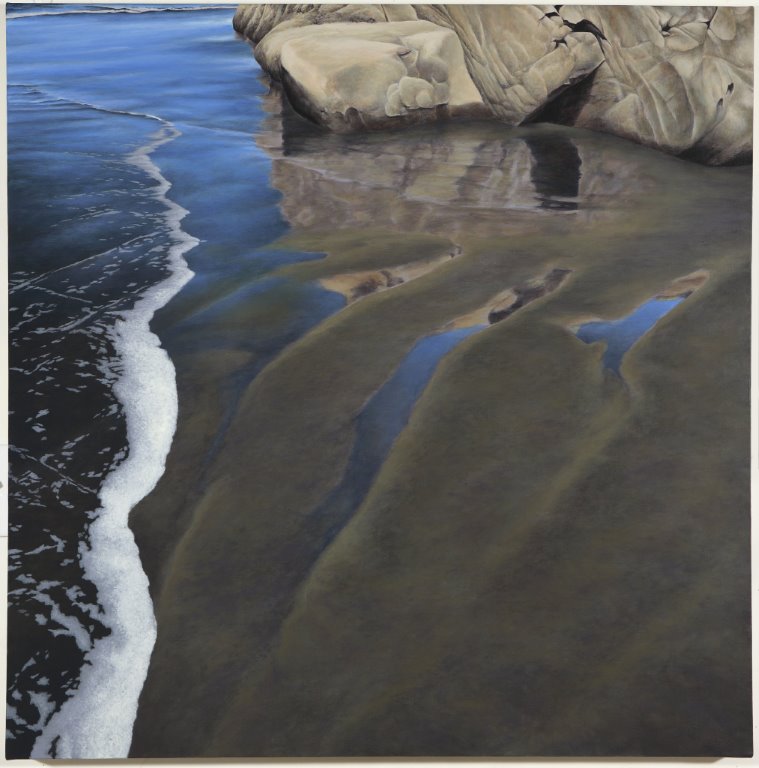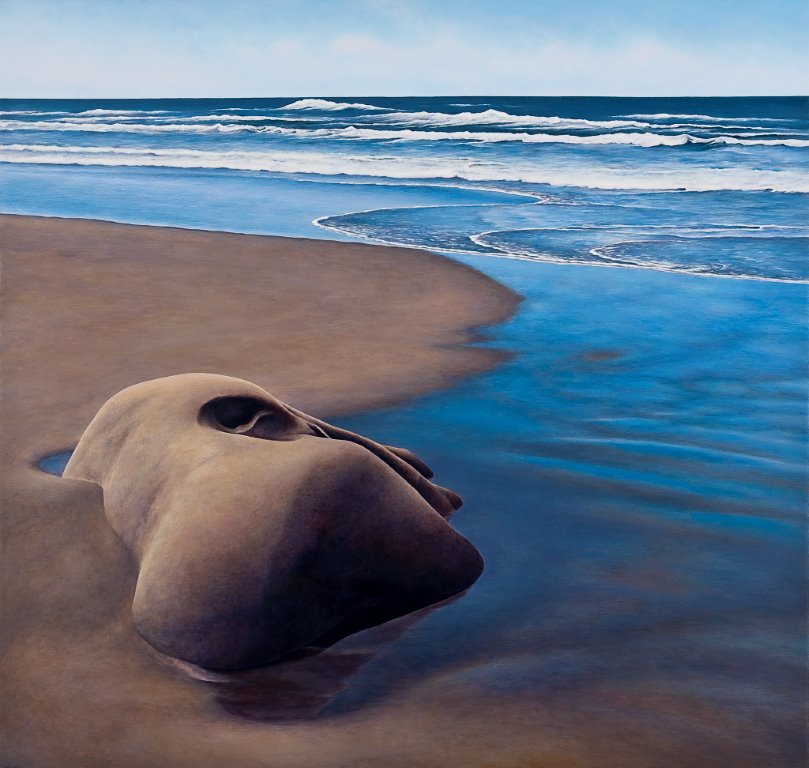Book Review – Wishbone: A Memoir in Fractures
Reviewed by Lee Olsen
Wishbone: A Memoir in Fractures, by Julie Marie Wade.
Colgate University Press, 2010. $17.95.
“As I wash up on the soft shore of the morning—body intact, heart irreversibly fractured—I feel my legs, strong and sturdy, and the longing for fins recedes a little further. I am (for the moment) gill-less, guilt-less, without guile or regret.
“Like the given in math, from which we proceed to solve problems, give proof” (63).
I came upon Julie Marie Wade’s Wishbone, fortuitously, while organizing Bellingham Review’s contributor library. I recognized her name, nestled under a rocky outcropping, on a grayscale shoreline pictured disjointedly on the cover of the book—Julie is one of our upcoming contributors.* I read the memoir over the course of three days and I was enthralled, genuinely. Wade’s organic voice led me effortlessly through her story of dismantling and change, and I couldn’t break away. “The sea has always come naturally to me,” says Wade. “I am a native speaker of wave, a nubile swimmer at ease in the surf, a lover of starfish and salt. It’s true you can’t step twice in the same river, but the ocean is always the same: its lusty recursive circles, its breathless eternal lure” (53). If Wade—raised on the Puget Sound in West Seattle, Washington—is fluent in the language of the ocean, so, too, is she fluent in the language of fluid poetry. Each flowing sentence, each coursing section is drastically diverse, always changing, expanding, and contracting. However, the work in its entirety holds the reader, carries her or him through the troughs and swells of Wade’s life with an incredible sense of cohesion.
“Let me dip the ladle further down in time,” she implores: “Let me tell you about the family I was destined to leave behind. There’s a word for this too—estrangement.” This passage arises halfway through and exemplifies Wade’s voice. “A word that, not unlike erosion, happens over time, gradual and irreparable as any sedimentary story. Here, I’ll show you. Imagine you are walking on a shore, barefoot, . . . You are curious about the workings of this ocean: how it breaks whole colonies apart; how it pantomimes this daily regimen of displacement, . . . you are not thinking then about culminations. You are not thinking about endings. You want only for simple, reasonable things” (68).
Welling up in the offshore waters of speech and consciousness, drifting between poetic prose and prosaic poetry, Wade’s voice drips and pours, ebbs and flows. Her fractured form meanders, pauses, churns across the gnarled tidal zone of a fractured life—like tireless sea waves, forward and back—always back—back to a state of wondrous childlike honesty, investigation, invention, and self-transformation. Employing elegant prose, poetry proper, lyrics, dialogue, definitions, hypothetical letters, etymology, taxonomy, and so on, Wade depicts her search for acceptance, for realized sexuality, for increased awareness and personal peace. For example: “Lexicon-building: Coma, from the Greek for “deep sleep”; often occurs following trauma to the skull. Think of Sleeping Beauty. Think of Rip Van Winkle. Think of spells, which must be broken” (133).
 So it goes, Wade’s spell-breaking voice, re-awakening the reader constantly, shifting from sea to land, concrete to abstract, present to past, childlike to deeply philosophic. From the foggy hinterlands of only-child, constrained childhood—seaside vacations, Catholic school days, youth camp—back in time to meet grandparents before they were grandparents and parents before they were parents. Away to university, through the dry cactused desert of discrimination, misunderstanding, and hatred, close beside her lover—“We had entered the nowhere world: no gas stations, no cell phone service, no certain end to the sprawling, sun-laden days. Forget about the birds we knew, forget about the trees. . . . We laugh, but it becomes a metaphor for the way we lose things slowly, these incremental progressions of grief despite the spectral backdrop of joy” (66). And away, to the nurturing sea of love and complete belonging. Wade captivates the reader—subtly, embracing the imagination like an Oregon summer’s sea breeze, like a strong stroke through a familiar, friendly swimming pool—she masterfully leads her narrative across time and space, across literary forms, delivering the reader with a fresh, enlightened feeling of humanness and what it means to be humane. In all its fractured grandeur, through breaking and re-assembling, Wade’s Wishbone typifies poetic autobiographical success.
So it goes, Wade’s spell-breaking voice, re-awakening the reader constantly, shifting from sea to land, concrete to abstract, present to past, childlike to deeply philosophic. From the foggy hinterlands of only-child, constrained childhood—seaside vacations, Catholic school days, youth camp—back in time to meet grandparents before they were grandparents and parents before they were parents. Away to university, through the dry cactused desert of discrimination, misunderstanding, and hatred, close beside her lover—“We had entered the nowhere world: no gas stations, no cell phone service, no certain end to the sprawling, sun-laden days. Forget about the birds we knew, forget about the trees. . . . We laugh, but it becomes a metaphor for the way we lose things slowly, these incremental progressions of grief despite the spectral backdrop of joy” (66). And away, to the nurturing sea of love and complete belonging. Wade captivates the reader—subtly, embracing the imagination like an Oregon summer’s sea breeze, like a strong stroke through a familiar, friendly swimming pool—she masterfully leads her narrative across time and space, across literary forms, delivering the reader with a fresh, enlightened feeling of humanness and what it means to be humane. In all its fractured grandeur, through breaking and re-assembling, Wade’s Wishbone typifies poetic autobiographical success.
*Note: Julie’s collaborative essay “Word Problems,” with Denise Duhamel, along with an interview of the two, will appear in our 2014 Spring edition.
Born in Seattle in 1979, Julie Marie Wade completed an MA in English at Western Washington University and an MFA in Poetry at the University of Pittsburgh. She is the author of Wishbone: A Memoir in Fractures (Colgate University Press, 2010), winner of the Lambda Literary Award in Lesbian Memoir; Without: Poems (Finishing Line Press, 2010), selected for the New Women’s Voices Chapbook Series; Small Fires: Essays (Sarabande Books, 2011), selected for the Linda Bruckheimer Series in Kentucky Literature; Postage Due: Poems & Prose Poems (White Pine Press, 2013), winner of the Marie Alexander Poetry Series. Her forthcoming collections are Tremolo: An Essay (Bloom Press, 2013), winner of the Bloom Nonfiction Chapbook Prize, and When I Was Straight: Poems (A Midsummer Night’s Press, 2014), which will debut at AWP in Seattle, 2014—a signing is scheduled for Thursday, February 27th, 2 PM, at A Midsummer Night’s Press table. Wade is the newest member of the creative writing faculty at Florida International University. She lives with her partner, Angie Griffin, in Dania Beach. Learn more at www.juliemariewade.com.
[printfriendly]